Our Blog
Thanksgiving Pet Safety Tips

During this season of Thanksgiving, we want to express our gratitude to you, the amazing pet owners! Thank you for supporting our small business over the years. We hope you all have a safe and fun Thanksgiving. We have some tips to share to help keep your furry companions safe, happy and healthy next week!
1.Interaction With Other Pets: If your pet will be boarded somewhere or will be interacting with other animals, make sure he is up to date on his vaccines. If your pooch will be interacting with other dogs, he should not only have his core vaccines, but also the social vaccines like Bordetella (Kennel Cough) and CIV (Flu Vaccine). Not sure if your pooch has these vaccines? If you are already a client at SDMVC, download our app to see what vaccines your pet has.
Our App: https://vitusvet.com/pet-owners/
Need to get your pets updated, schedule an appointment here.
2. Travel: Whether you are going across town or to another state, traveling can be stressful for our pets. A pet carrier with pheromones is a simple way to help your pet remain calm during travel. If your pet gets sick or has major anxiety during travel, contact us. We can help.
3. Guests in the Home: Having extra people in the home can be overwhelming for our pets. Designate a crate or quiet room for her to retreat to. Play soft music and give her an interactive toy, such as a kong filled with peanut butter to help them feel more at ease. Swing by the clinic to check out our supply on interactive toys!
4. Probiotics: The holidays always cause a disruption in the daily routine. Did you know 70% of your pet’s immune system is in the gut. When disruptions occur your furry friend is more likely to have soft stools and is more prone to illness. Giving probiotics is a great way to strengthen your pet’s immune system. Starting it now before the holiday and continuing it until things are back to normal will help your dog or cat stay healthy. We have probiotics available that are as simple as sprinkling it over their food each day. You can find it on our online store or we have it available in our clinic.
5. Food & Snacks: Especially with guests in the home, make sure your pets don’t get anything to eat that will make them sick. Most people know chocolate is toxic to our pets, but did you know an artificial sweetener called xylitol can be deadly to our pets? It is found in many types of desserts and candies. Turkey may seem safe, but it can be just rich enough to cause an upset stomach or worse, pancreatitis. Pet Poison Helpline is a 24- hour resource if your pet gets into something toxic.

Itchy Pet? Here’s What You Need To Know
Has your dog or cat been itchy and uncomfortable lately?
Pets can display these symptoms any time of the year, but we tend to see an increase during this time of the year. Thankfully, there are many things we can do as pet owners to help our pets find relief!
First things first: Are all pets in the home protected against fleas?
Even if your pets are 100% indoors, they all need to be protected. We can carry fleas in just as easy as they can pick up fleas outdoors. The cooler 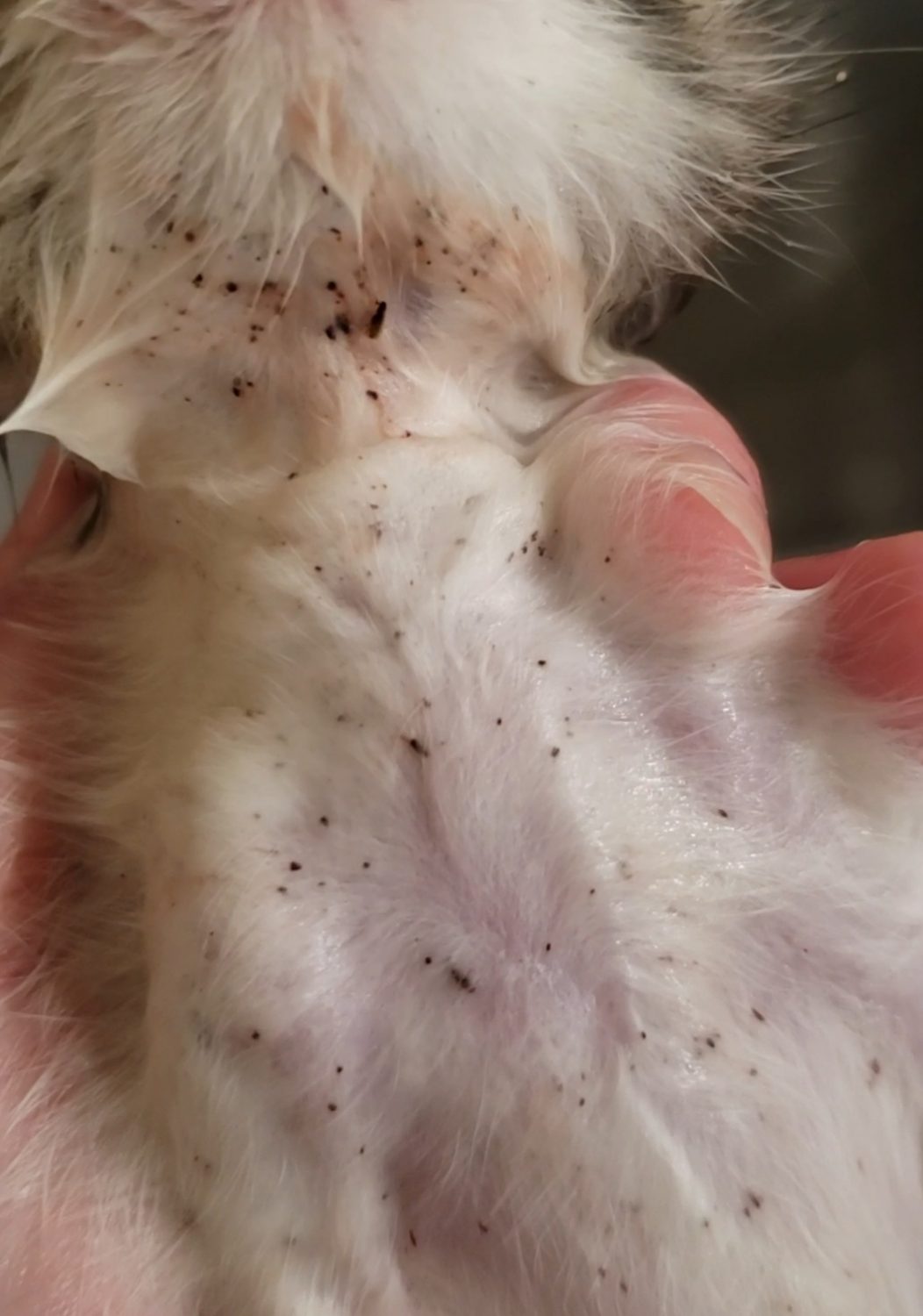 weather should not be an indicator that it’s okay to stop a preventive. The fleas are still out in full force and ticks actually thrive in the 50-60 degree weather so tick protection is important as well during this time of the year. Click here for more info on flea and tick symptoms and preventive care. If you see any of these symptoms, please contact your veterinarian.
weather should not be an indicator that it’s okay to stop a preventive. The fleas are still out in full force and ticks actually thrive in the 50-60 degree weather so tick protection is important as well during this time of the year. Click here for more info on flea and tick symptoms and preventive care. If you see any of these symptoms, please contact your veterinarian.
Allergies: Pets can get them too.
While humans sneeze and have a runny nose, dogs and cats express their allergies through their skin. If you notice your pet starting to itch a little more than normal, one thing you can do at home is give him a bath. Make sure to use cool water and an oatmeal based pet shampoo for best results. For dogs, you can wipe off his feet with a washcloth or baby wipe after going outside to eliminate some of the pollen he picks up outside.
Still uncomfortable?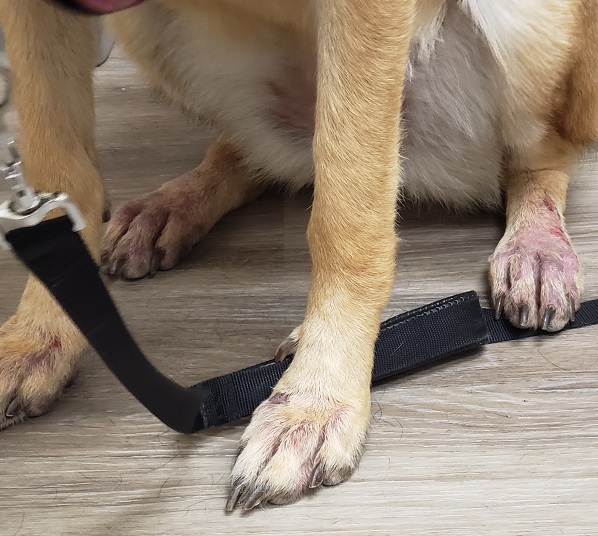
If you pet is causing open sores from scratching or unable to settle down to rest, he should see a Veterinarian. There are a wide variety of medications that your Veterinarian can prescribe to provide relief for your pet.
If it’s time for your pet to see a Veterinarian, you can set up an appointment here.
Vaccines 101: For Dog Owners in Des Moines, Iowa
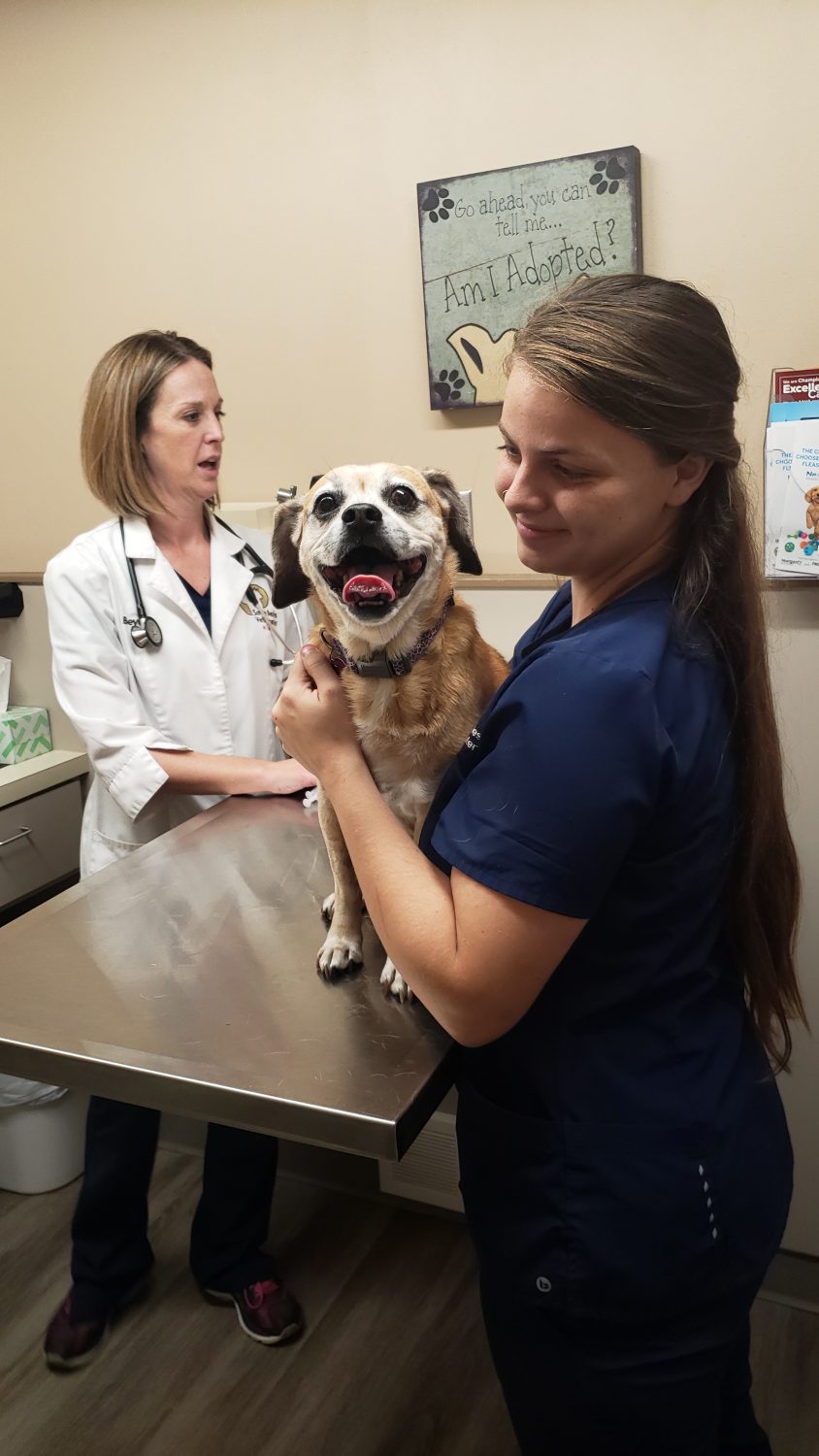 Vaccines should be catered to each individual pet. Location, lifestyle and the dog’s health are all things that should be taken into account when determining what vaccines your dog should have. Your Veterinarian will partner with you to create a plan to keep your pooch at his healthiest!
Vaccines should be catered to each individual pet. Location, lifestyle and the dog’s health are all things that should be taken into account when determining what vaccines your dog should have. Your Veterinarian will partner with you to create a plan to keep your pooch at his healthiest!
First off, location does play a factor in what vaccines are necessary for your pet. There are certain diseases or bacteria that are more relevant in our area than other parts of the country and vice versa. The rattlesnake vaccine is unheard of in Iowa for obvious reasons, but down south in certain areas, you may see a dog with this vaccine. We also have different wildlife and bugs that transmit certain diseases in our area. For example, have you ever found a tick on you, your pet, or someone you know? In Iowa, approximately 1 out of every 36 dogs was diagnosed with Lyme Disease in 2018. In South Carolina, it was 1 out of 84 dogs, and in Louisiana 1 out of 748. Location definitely matters.
Your dog’s health also plays a factor in vaccines. If your pet is sick or has some sort of illness, this can play a role in whether or not timing is good for vaccines. Maintaining a relationship with your veterinary team is essential for this.
Lastly, lifestyle plays a factor. Where your dog goes, what activities he partakes in, what types of animals he interacts with, all will play a factor in your pet’s needs. So lets break down the vaccines and talk about when and why certain vaccines are important.
Rabies Vaccine: When we think about Rabies, we tend to associate it with an angry dog drooling heavily like in the movie, Old Yeller. While this can be an accurate representation of Rabies, there’s more that you should know. First off, Rabies is fatal in an unvaccinated dog. Always. Let that sink in for a moment. It is always fatal. There is no treatment, there is no way to stop it once contracted.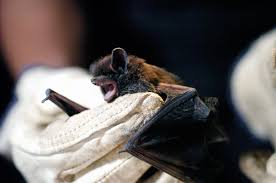
Secondly, Rabies is zoonotic. This means that it can be transmitted from animals to humans, typically through a bite. Many types of mammals can contract Rabies, not just our companion animals. In Iowa, the more common wild mammals to contract Rabies are skunks, bats, raccoons and foxes.
Distemper Combo Vaccine: This is another very contagious disease and can also be fatal. There is no cure for distemper, only supportive care can be given once exposed. Puppies and dogs with compromised immune systems are most at risk for this disease. The combo vaccines typically protect your pooch against specific upper respiratory viruses as well as the commonly known, parvo virus. Parvo is spread dog to dog through feces, both directly and indirectly. Puppies are most at risk from this disease. Following a vaccine protocol provided by your veterinarian and avoiding potential high traffic dog areas for the first couple of months is important if you have a new puppy. Recovery from parvo can be dependent on how quickly your pup receives treatment. It is also very expensive to treat with no guarantee on recovery.
Leptospirosis (Lepto) Vaccine: While we used to consider dogs that went hunting or swimming often most at risk for leptospirosis, we  are finding that dogs that only go outside in their own backyard are just as much at risk in Iowa. Leptospirosis is a bacteria that is spread through the infected urine of wildlife. Common carriers include deer, raccoons, oppossums, skunks, and other rodents that we may see in our neighborhoods. This can also be spread to humans. Many times we see an increase of Lepto after heavy rainfalls or flooding in our area. If caught early, lepto can be treated by your Veterinarian. The vaccine protects against the 4 most common strains of Leptospirosis.
are finding that dogs that only go outside in their own backyard are just as much at risk in Iowa. Leptospirosis is a bacteria that is spread through the infected urine of wildlife. Common carriers include deer, raccoons, oppossums, skunks, and other rodents that we may see in our neighborhoods. This can also be spread to humans. Many times we see an increase of Lepto after heavy rainfalls or flooding in our area. If caught early, lepto can be treated by your Veterinarian. The vaccine protects against the 4 most common strains of Leptospirosis.
Bordetella Vaccine: Bordetella, commonly known as kennel cough, is a high contagious respiratory infection spread from dog to dog. Symptoms include coughing, hacking, gagging and lethargy. If your dog interacts with other dogs or visits high dog traffic areas on a regular basis he/she should have this vaccinate. If you take your pooch to the following places in Des Moines on a regular basis, he/she should be vaccinated:
- Dog Park
- Gray’s Lake
- Doggy Daycare
- Pet Store
- Boarding Facility
- Groomer
- Farmer’s Market
- Any other places with high dog traffic
Canine Influenza Virus (CIV): Commonly known as the dog flu, canine influenza is also high contagious betwe en dogs. Symptoms can appear similar to kennel cough, but can develop into more severe cases with high fevers or pnemonia. While humans get their own version of influenza, there are no cases of the canine influenza being transmitted to humans. If your pet is at risk for kennel cough, he/she is also at risk for influenza and should be vaccinated against both.
en dogs. Symptoms can appear similar to kennel cough, but can develop into more severe cases with high fevers or pnemonia. While humans get their own version of influenza, there are no cases of the canine influenza being transmitted to humans. If your pet is at risk for kennel cough, he/she is also at risk for influenza and should be vaccinated against both.
Lyme Vaccine: Lyme disease is the most common vector-borne illness spread by ticks. While ticks can transmit lyme disease to humans, it is not zoonotic. In Iowa, we tend to see the most ticks in the spring and fall, when the weather is a little bit cooler. People commonly think ticks are typically found in trees, but this is a myth. We tend to find ticks in areas where there is tall grass. If you have ever found a tick on yourself or 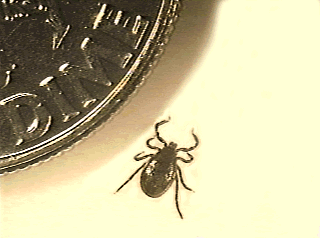 a family member, your pet is also at risk and he/she should be vaccinated for Lyme disease. In Iowa, approximately 1 out of every 36 dogs gets Lyme disease. Symptoms of Lyme disease in your pooch include lameness, swollen or painful joints, lethargic and decreased appetite.
a family member, your pet is also at risk and he/she should be vaccinated for Lyme disease. In Iowa, approximately 1 out of every 36 dogs gets Lyme disease. Symptoms of Lyme disease in your pooch include lameness, swollen or painful joints, lethargic and decreased appetite.
Rabies, Distemper combo and Leptospirosis vaccine are all considered core vaccine in our area. This means all dogs should be protected 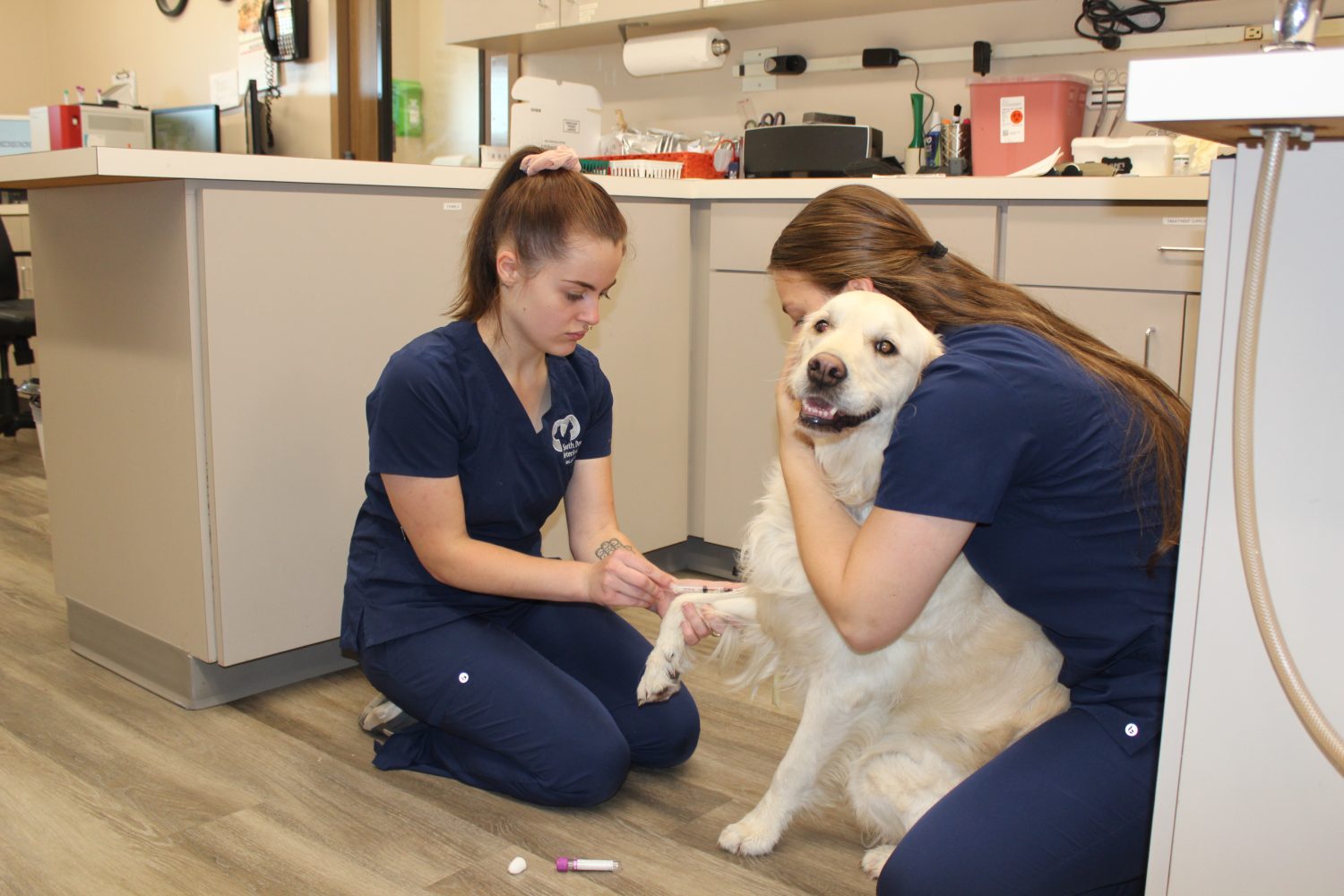 against these dieases for their healthy and safety. Bordetella, Influenza and Lyme are what we call “lifestyle vaccines”, meaning if their exposure is high to these potential dieases, vaccines should be considered. Teaming up with your Veterinarian to discuss you dog’s health, location and lifestyle is the best way to make a plan to keep you pup happy and healthy!
against these dieases for their healthy and safety. Bordetella, Influenza and Lyme are what we call “lifestyle vaccines”, meaning if their exposure is high to these potential dieases, vaccines should be considered. Teaming up with your Veterinarian to discuss you dog’s health, location and lifestyle is the best way to make a plan to keep you pup happy and healthy!
Need to set up an appointment, click here.
September Spotlight: Save 50% On Preventive Bloodwork For Your Pets!
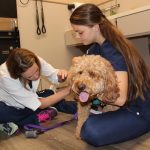 A wellness exam and vaccines are the expectation when you bring your pet to the Veterinarian for their yearly check-up. But what about annual bloodwork? It is expected for surgery or if your pet is ill, but what about when everything checks out great upon physical exam? Is it beneficial? Is it cost efficient?
A wellness exam and vaccines are the expectation when you bring your pet to the Veterinarian for their yearly check-up. But what about annual bloodwork? It is expected for surgery or if your pet is ill, but what about when everything checks out great upon physical exam? Is it beneficial? Is it cost efficient?
As we humans age, bloodwork becomes part of our annual check-up to get baseline values and monitor them as we age. This helps doctors identify any abnormalities early as well as watch any trends over time. They then can make recommendations on lifestyle changes or medications that can help keep us healthy and feeling better longer.
What if we could do the same thing for our pets?
Did you know 1 out of 7 pets under the age of 8 have a hidden abnormality? As our pets age, this statistic increases. If we can find 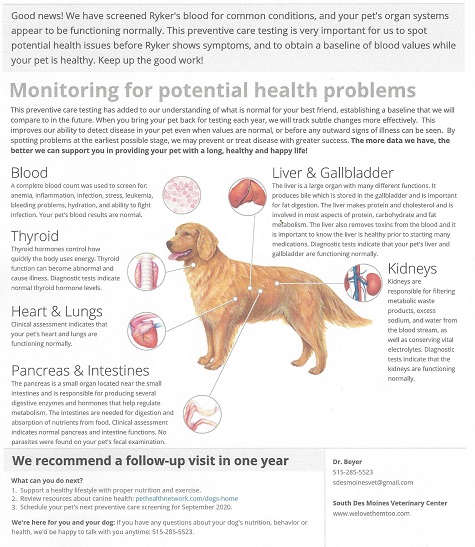 abnormalities early, we have the opportunity to make changes, whether that be lifestyle changes or medication changes to help keep your pet healthy and happy longer. That’s what this is all about, right?
abnormalities early, we have the opportunity to make changes, whether that be lifestyle changes or medication changes to help keep your pet healthy and happy longer. That’s what this is all about, right?
We have partnered with our lab company to provide special pricing for preventive blood panels for your pets for the month of September. These blood panels include checking organ functions, like liver and kidneys, looks for hidden infection and inflammation, and also checks for internal parasites like heartworm disease, among other things.
We are offering up to 50% savings on preventive blood panels for your pet during the month of September. Call the clinic or click here to request an appointment to keep your pet happy and healthy!
Does My Cat Need to See the Veterinarian?
How do you know if you furry feline is sick?
Cats are very good at hiding illness, especially in the early stages. Here are 7 subtle changes your cat may need to visit the veterinarian.
1. Inappropriate Elimination: If your cat is not using the litterbox, it is sure sign that something is wrong. Not using the litterbox can be due to a health problem like a urinary tract infection or a behavior problem, both of which your veterinarian can help you with.
2. Changes in Interactions/Activities: If your cat is typically a snuggly cat and suddenly does not want to anymore, it could be a n indication that your feline is in pain. While it is normal for your cat to slow down as he/she ages, this can be an indication of arthritis. Increased activity can also be an indication of a medical problem like hyperthyroidism.
n indication that your feline is in pain. While it is normal for your cat to slow down as he/she ages, this can be an indication of arthritis. Increased activity can also be an indication of a medical problem like hyperthyroidism.
3. Changes in Food/Water Consumption: Pay attention to how much your cat eats and drinks each day. If your feline’s appetite has decreased, it typically means something is wrong. Another thing to pay attention to is water intake. Many times increased water intake is an indication that something is wrong. If you are having trouble keeping track of your cat’s food and water intake, measure out the food and water given each day to keep track.
4.Weight Loss or Gain: A change in weight doesn’t always correlate with appetite changes. Cats that have hyperthyroidism or diabetes can lose weight even with a consistent appetite.
5. Changes in Grooming Habits: Cats are meticulous groomers. Changes in your feline’s coat include hair loss, greasy, dull looking, matting are all indications that something may be wrong.
6. Hiding/Sleeping Changes: Cats are social animals. They enjoy interacting with their human family and other pets. Changes in these interactions may be a result of an illness. It is normal for cats to sleep up to 16 hours each day. If this increases or deceases, it can also be a sign of illness.
7. Bad Breath: Did you know that over 70% of cats have dental disease by the age of 3? It is important to have you cat’s teeth checked at every exam. Bad breath is an early indicator of an oral problem.
Whether it’s routine or illness, we are here to help you get the best care possible for your feline companions. To set up an appointment, click here.
5 Things You Should Know About Golden Retrievers
Golden Retrievers have been one of the most popular breeds in the United States over the past 10 years. They are cuddly companions and 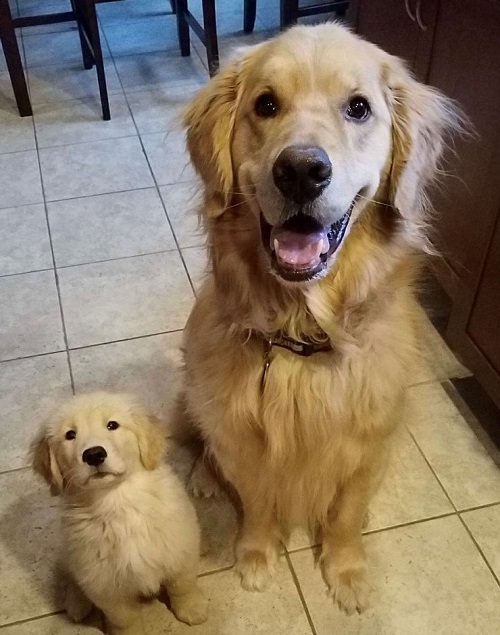 make great pets. Here are a few facts to know if you own a Golden Retreiver or are thinking about getting one!
make great pets. Here are a few facts to know if you own a Golden Retreiver or are thinking about getting one!
- Floppy Ears. Any breed of dog that has floppy ears has an increased risk of infection as it traps moisture. Weekly ear cleanings with a good cleanser will decrease their risk of infection. It is very common for Goldens to need regular ear cleaning. This is a good ear cleanser that we use. If your Golden’s ears start to smell funny, this is a good indication they need to visit the vet as they may have an infection.
- Joint Care. Large breed dogs need extra joint care. Start them young on a joint supplement to help protect their mobility and health.
- Grain Free Diets. This is a big “no no” for Goldens. Grain free is a very popular trend right now among human diets as well as our pet diets. We need to remember that grain free may not actually be a healthy choice for our pets. In fact, it is not a balanced diet at all for Golden Retrievers and can cause MAJOR heart problems.
- Grooming. Regular bathing and brushing will help keep your Golden’s coat healthy and smooth (and smell amazing!) We know a groomer who loves giving those big kids a Spa Day!
- Loveable. Goldens are one of the most loveable breeds you will meet. Adopting a Golden Retriever can be a great addition to your family!
Whether your Golden has an ear problem, needs grooming or vaccines updated, we can’t wait to see you next!
A Farewell Letter
To My Friends at SDMVC,
It is with a heavy heart, I say goodbye to 32 years of working at South Des Moines Veterinary Center. I have been blessed by three wonderful bosses, Dr. John Matson, Dr. Brenda Flaming and Dr. Melissa Beyer. I learned a great deal from all three, but I like to think I taught them a little too.
I have worked with countless great people over the years, but I will tell you the team you have now is terrific. This crew is full of energy, great ideas and compassion for you and your furry kids.
Many of you have become my friends over the years as we have bonded over the joy, love, frustration and even sorrow of letting these furry critters into our hearts. This has been a great gift to me and has made my life richer. So thank you from the bottom of my heart for sharing those special times.
I look forward to whatever the future has in store, but I wanted you to know you all have a special place in my heart.
Love,
Kathy Parker
New Puppy or Kitten? Save 10% on our Puppy & Kitten Packages!
Did you recently add a new puppy or kitten to your family?

Congratulations on the arrival of your new puppy or kitten! Preventive care is one of our top priorities, and we provide puppy and kitten wellness programs and packages to make it easy for your new pet to get the preventive care he or she needs. Your new pet’s first wellness visit should be at about 6–8 weeks of age. Our puppy and kitten consults generally include a full physical wellness exam, age and lifestyle appropriate vaccinations, deworming, dermatology check, and behavior advice. We are also excited to provide information on general wellness care for your new pet.

We are offering puppy and kitten health care pacakges to help you keep track of your new pet’s health easily! Each of these packages bundle vaccines your pup or kitten needs in his/her first year of life and you save 10% on the cost!
Ready to schedule? Click here.


Holiday Tips With Your Pets!
They say “It’s the most wonderful time of the year.”
While that is certainly true, things can quickly change if your cat slips out the door as company arrives or if the dog gets sick on the long drive to Grandma’s house. Here are 6 tips to help the holidays go smooth with pets.
- Traveling: Whether you are going across town or to another state, traveling can be stressful for our pets. A pet carrier with pheromones is a simple way to help your pet remain calm during travel. If your pet gets sick or has anxiety during travel, contact us. We may be able to help.
- Interaction With Other Pets: If your pet is boarding or will be interacting with other animals, make sure your pet is up to date on their vaccines. Canines should be vaccinated against kennel cough and influenza to ensure they are protected if they will be interacting with other dogs.
- Guest In the Home: Having extra people in the home can be overwhelming for our pets. Designate a crate or quiet room for them to retreat to. Play soft music and give them interactive toys to help them feel more at ease.
- Probiotics: The holidays always cause a disruption in the daily routine. 70% of your pet’s immune system is in the gut, so when disruptions hit your furry friend is more likely to have soft stools and be more prone to illness. The good new is a probiotic is great way to strengthen your pet’s immune system. We have a very easy to give your pets during the holiday season. You just sprinkle it over your pet’s food once daily. We have it in the clinic or online.
- Decorations: Supervise your pets around the decor. Christmas trees can be easily tipped over by our pets. Plus, all the shiny ornaments look like new toys in their eyes. Skip the tinsel: cats are notorious for eating tinsel which can cause some major GI upset. Also, watch those holiday plants and flowers. Many are toxic to our pets.
- Food & Snacks: Especially with guest in the home, make sure your pets don’t get anything to eat that will make them

sick. Most people know that chocolate is toxic to our pets, but did you know an artificial sweetner called xylitol can be deadly to our pets? It is found in many types of desserts and candies. Turkey may seem safe, but it can be just enough to cause an upset stomach or worse, pancreatitis. Yeast/Dough is never safe for your furry companions. Pet Poison Helpline is a 24-hour resource if your pet gets into something over the holidays.
If you need to set up an appointment before the holidays, click here.
Buy 2, Get 1 Free! All Toys & Treats: Mix & Match!
It’s Christmas in July!
Spoil your pets all month long with new toys and treats. 2 items, Get 1 free*!
Mix and match with any toys or treats at South Des Moines Veterinary Center! Stock up for both dogs and cats. From interactive toys to harnesses, and dental chewz to lean treats. Find something for all of your pets. Check out the videos below of our daycare dogs enjoying a few of the toys we carry.
*Free items must be of equal of lower value.
